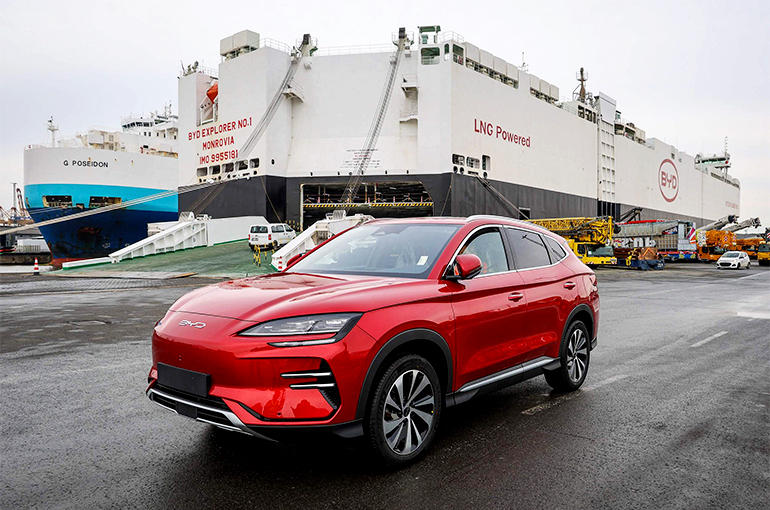 EU Threat of Tariff Hikes on Chinese EVs Draws Fire From Various Quarters
EU Threat of Tariff Hikes on Chinese EVs Draws Fire From Various Quarters(Yicai) June 13 -- The European Union's decision to slap sharply higher tariffs on electric vehicles imported from China has been denounced by organizations and businesses, including European carmakers and Germany’s auto industry body, with China’s commerce ministry calling it “blatant protectionism.”
“China is deeply concerned and strongly dissatisfied with this development,” a commerce ministry spokesperson said after the European Commission, the EU’s executive arm, yesterday announced countervailing duties on Chinese EVs ranging from 17.4 percent to 38.1 percent from July 4 following an anti-subsidy investigation.
The EU’s findings lack factual and legal basis, the official said, adding that the EC overlooked the fact that the advantages of China’s EV industry stem from openness and competition. It also disregarded World Trade Organisation rules and failed to recognize the full cooperation of Chinese companies during the investigation, the person said.
By arbitrarily creating and exaggerating China’s “subsidy items” as well as abusing the “facts available,” the EC ruled that China offered subsidies at excessively high levels, the spokesperson said. This is “blatant protectionism” that will create and escalate trade frictions, undermine the Chinese EV industry's rights and interests, and disrupt global auto supply chains, including those in the EU, the official added.
‘Spillover Effect’
The China Chamber of Commerce to the European Union also said yesterday that it was shocked, gravely disappointed, and deeply dissatisfied with the EC’s protectionist trade measure.
The CCCEU said it “believes the measure will seriously impair the legitimate rights and interests of BEV [battery electric vehicle] manufacturers and related supply chain in China, distort the fair competition in the European market to the detriment of Chinese BEV companies, and exert negative impacts on China-EU trade and cooperation in the automotive sector.
“Furthermore, the Chamber expresses serious concern and apprehension that the spillover effect will present challenges to China-EU economic and trade relations, as well as bilateral relations,” it said in a statement.
The European Commission “provisionally concluded” that the BEV value chain in China benefits from unfair subsidies, causing a threat of economic injury to EU EV makers, the commission said. Based on its anti-subsidy investigation, the EC has temporarily established that it is in the EU's interest to remedy the effects of the unfair trade practices by imposing provisional tariffs on Chinese EV imports, it noted.
The EC will levy a countervailing duty of 17.4 percent on BYD’s electric cars, 20 percent on Geely Auto’s, and 38.1 percent on SAIC Motor’s, the commission said. In addition, a 21 percent duty will be imposed on EV makers that cooperated in the investigation but were not sampled, while a 38.1 percent duty will fall on those who did not cooperate, it noted.
The Chinese automakers that collaborated in the EU probe, but were not sampled, include Aiways Automobile, Jianghuai Automobile Group, BMW, Chery Automobile, First Automotive Works, Changan Automobile, Dongfeng Automobile, Great Wall Motor, Leapmotor Technology, Nanjing Golden Dragon, Nio, Tesla, and Xpeng Motors.
The EU imposes a 10 percent tariff on all imported cars.
The CCCEU also noted: “According to the chamber's recent survey within the Chinese EV industry, imposition of a 10 percent additional levy would already carry significant implications for most Chinese car manufacturers, resulting in a substantial negative impact on their exports to Europe.
“The rates spanning from 17.4 percent to 38.1 percent will pose a serious market barrier,” it added.
‘Global Risk’
The German Association of the Automotive Industry, or VDA, expressed its reservations about the new tariffs on Chinese EVs. “It is a further step away from global cooperation,” VDA President Hildegard Muller said.
“This measure further increases the risk of a global trade conflict,” Muller said. “It is also a fact that countervailing duties on e-cars imported from China are not suitable for strengthening the competitiveness of the European automotive industry.
“The potential damage that could be caused by the measures may be greater than the potential benefits for the European -- and in particular the German -- automotive industry,” she added.
Dialogue and cooperation with China are essential to address challenges such as issues related to subsidies and trade conflicts, Muller pointed out.
German auto giants BMW, Volkswagen Group, and Mercedes Benz, as well as Chinese carmakers such as Chery and Nio, have each said they oppose the additional tariffs.
It is uncertain whether China will take countermeasures, China Automotive News reported, following speculation that the country may consider temporarily hiking tariffs on large-displacement vehicle imports and slapping duties on European wines, dairy, and other products.
Editor: Martin Kadiev